- Home
- J. T. Edson
Calamity Jane 10 Page 5
Calamity Jane 10 Read online
Page 5
‘I reckon you’d better have a look at this, lieutenant,’ the uniformed sergeant remarked quietly, taking advantage of his immediate superior’s preoccupation with the doctor. Holding out the cutthroat razor he had picked up on his arrival, he indicated Gorr-Kauphin. ‘I found it lying open near him. But if it had been used, it’s been wiped clean. Not that there’s anything to say it has been. Only I thought it was strange, finding it.’
Accepting the razor, Ballinger agreed with the sergeant’s last comment. Opening its blade, his intention was to discover where it had been manufactured rather than to corroborate that it had not been used. Having ascertained that it was made in the United States and closed the blade, he was dropping it into his jacket’s right hand pocket when he glanced to where the attendants were starting to lift the stretcher. Then he stared harder.
‘Hold it, fellers!’ the lieutenant ordered, stepping forward.
‘What are you doing?’ the doctor demanded, his attention diverted from O’Halloran by the sight of Ballinger who was bending over the stretcher and moving Gorr-Kauphin’s head slightly, to peer under the chin.
‘Did you say the back of his skull was fractured?’ the detective asked, straightening up.
‘I did,’ the doctor confirmed.
‘How’d it happen?’ Ballinger inquired.
‘I’d say that’s obvious,’ the doctor replied. ‘He fell backwards down the stairs.’
‘Fell, or was kicked?’ Ballinger challenged.
‘Kicked?’ the doctor snorted, making it plain that he considered the suggestion was preposterous.
‘What makes you think he was kicked down, Ed?’ O’Halloran asked, having a healthy respect for the detective’s ability.
‘There’s what I thought was just a bad bruise under his chin,’ Ballinger explained. ‘But when I looked closer, I found it was blacker than if it was only bruising. More like boot polish. What do you reckon, doctor?’
‘You’re right,’ the intern confirmed, having moved forward and duplicated the detective’s scrutiny. ‘I didn’t see it because Miss Gorr-Kauphin came before I could make a thorough examination. Let’s get him to the ambulance, men!’
‘So he didn’t just slip and hurt himself!’ O’Halloran breathed, watching the party from the hospital go up the stairs.
‘I wouldn’t want to take bets that he did,’ Ballinger replied dryly.
‘Then the fire could have been set off deliberately as well!’ O’Halloran went on, sounding even more perturbed.
‘There’s a good chance it was,’ Ballinger admitted. ‘Way I figure it, that gent saw and chased whoever touched it off; but got kicked down the stairs for doing it.’
A sense of consternation filled the captain as he began to appreciate the implications behind the detective’s suppositions. Despite the questions he had asked the doctor, which had been motivated by nothing more than a desire to establish his presence, he had not given the matter much consideration. Now he found himself faced with the possibility that it might be far more serious than he had anticipated. If a famous foreign actor—as he believed Gorr-Kauphin to be—should die, the circumstances were sure to attract attention. They would be reported not only in the city’s newspapers, but throughout the United States and perhaps even in Europe. Knowing the main reason for the evening’s entertainment at O’Malley’s Grand Emerald Isle Theater that night, he suspected that the local dignitaries who had sponsored it would not welcome such publicity.
‘Will you handle things here, Mick?’ the detective went on.
‘Me?’ O’Halloran asked, in surprise and without enthusiasm. ‘But I thought you’d be staying seeing that you asked me to bring you along.’
‘I aim to,’ Ballinger stated. ‘You can get things going for me while I’m taking a look at the dressing-room and trying to find out who started the fire.’
‘Oh sure, Ed, I’ll do that for you,’ O’Halloran assented in tones of relief, then went on less certainly, ‘What is it you’re wanting me to do?’
Despite the captain’s explanation to the bogus priest, it had been Ballinger’s suggestion that he came to the theater. Considering how the situation appeared to be developing, O’Halloran was no longer sorry he had given his somewhat grudging permission. He could see the advantages of allowing the detective to continue handling the investigation. If it ended in failure, or in a way which the influential people involved with “Father Devlin” regarded as unsatisfactory, he would have a scapegoat upon whom he could place all the blame. On the other hand, he was confident that he could take the majority of credit for himself should all go well.
‘Take Sergeant Molloy and Sergeant Damon and have some of your men go with them to ask if anybody was seen coming out of the door there just after the fire started,’ Ballinger requested. He gave no indication of whether he could guess the reason for the captain’s eagerness to retain his services. ‘Folks will always answer more freely if they know the men they’re talking to.’
‘I’ll see to it,’ O’Halloran promised.
On his arrival at the dressing-room, Ballinger knocked and went in without waiting for permission. Closing the door behind him, he gazed around. The walls and ceiling were stained with smoke. However, although its mirror had been destroyed by the heat, the top of the dressing-table was barely marked in spite of the charred leather trunk which stood upon it partially covered in sand. Noticing in passing that there was nobody outside the shattered window, he wondered whether the patrolmen who were on the scene had cleared the alley of would-be spectators.
However, the detective’s main interest centered upon Vera and “Devlin”. She had not carried out her stated intention of collecting a cloak to wear on the journey to the hospital. Instead, she appeared to have been clearing some of the sand used to douse the fire from the trunk. What was more, although she had been glaring defiantly at the “priest” as he entered, she had reverted to the worried attitude which had been in evidence at the foot of the stairs on seeing who was coming through the door.
‘Has there been much damage?’ Ballinger inquired, walking forward.
‘We can’t tell yet,’ the impostor replied, darting a baleful scowl at the actress.
‘Could you fetch me my cloak from the alcove, please, lieutenant?’ Vera requested, wanting to prevent the detective from seeing what she had uncovered in the trunk.
‘Sure, ma’am,’ Ballinger agreed, turning aside to do so.
‘He’s not in the theater!’ Raoul Fourmies announced, entering and, failing to notice there was a stranger present, speaking freely as he walked towards the dressing-table, ‘How much of the money’s los—?’
‘Who’s not in the theater?’ Ballinger inquired, as the artist noticed the pointed stare “Devlin” directed at him and stopped speaking.
‘Who are you?’ Fourmies countered, playing for time in which to form an impression of how the impostor wanted him to reply.
‘This’s Lieutenant Ballinger of the Chicago Police Department,’ “Devlin” introduced, gritting out the words and inwardly cursing the artist’s inopportune arrival.
‘Who is it that’s not in the theater?’ the detective asked, taking the cloak from the alcove.
‘One of our small part players,’ Vera supplied. ‘He came in drunk tonight and I discharged him.’
‘And you think he may have done this?’ Ballinger suggested, returning with the cloak and indicating the trunk.
‘It was at the back of my mind he could have,’ the impostor replied, realizing that Fourmies’ indiscreet words had ruined any chance of passing off the fire as accidental. He had not intended to mention the money in the trunk, but the artist’s reference to it and the actress having been unable to restrain her impatience to check on how much was lost had rendered this impossible. ‘But I wanted to talk to him myself and be sure before I made any accusation.’
‘Huh huh!’ Ballinger grunted non-commitaly, passing the cloak to Vera. He noticed her hands were black and grimy as well a
s speckled with sand. Then he glanced into the trunk. It held a number of gold and silver coins, many of which were partially melted or otherwise distorted by the heat of the fire. ‘It looks like there’s a fair sum in here.’
‘There is,’ “Devlin” confirmed, trying to prevent any suggestion that he had more than a casual interest from showing in his voice. ‘Miss Gorr-Kauphin’s not had time to open a bank account, seeing as she’s on tour. So she’s needing it for her expenses.’
‘How much is here, ma’am?’ the detective asked.
‘Almost six thousand dollars,’ Vera answered bitterly, but without mentioning that nearly fifteen hundred of it had been in paper money which was destroyed.
‘Why did you bring it here?’ Ballinger wanted to know.
‘To pay the performers and stagehands,’ Vera lied, but convincingly. ‘I know it was injudicious -’
‘You couldn’t have guessed anything like this would happen,’ “Devlin” consoled, trying to decide how the detective was taking the explanation and failing to draw a conclusion from the expressionless face. ‘Could she, lieutenant?’
‘I reckon not,’ Ballinger answered and took the razor from his pocket. ‘This was lying near your brother, ma’am. Have you ever seen it before?’
‘No,’ Vera stated.
‘How about either of you gents?’ Ballinger continued.
‘Not that I know of,’ the impostor declared and, after Fourmies had also disclaimed all knowledge, went on, ‘What was it doing by Mr. Gorr-Kauphin?’
‘I think he saw whoever lit the fire and was hurt when he gave chase,’ Ballinger explained. ‘What did you say the missing feller’s name is, ma’am?’
‘Marcel Tinville,’ Vera answered. ‘Are you saying it was him Colin saw?’
‘I’m only saying what could have happened,’ the detective corrected. ‘The razor was near your brother, but he hadn’t been cut by it—’
‘He could have stepped back to avoid being cut and fallen, though,’ “Devlin” suggested, before Ballinger could elaborate upon his theory.
‘That could have been what happened,’ the detective conceded, deciding against mentioning the discovery he had made. ‘Marcel Tinville sounds French. Is he?’
‘Certainly not!’ Fourmies answered indignantly. ‘He’s from Belgium!’
‘Can you give me a description of him?’ Ballinger requested, returning the razor and taking a notebook and pencil from his inside pocket.
‘We have a photograph of him,’ Vera offered, putting aside her usual antipathy and disinclination to help the police in her desire to be avenged for the loss she had suffered, but she received a scowl of disapproval from the bogus priest.
‘I thought it was in the trunk?’ “Devlin” hinted, aware of the danger if Ballinger should apprehend the missing man and if he was guilty of lighting the fire.
‘Oh dear!’ Vera gasped, taking her cue and producing the kind of reaction that might be expected if the photograph had been destroyed. ‘So it was!’
‘I’ll have to settle for just the description then,’ Ballinger remarked philosophically, opening the notebook.
‘He’s about twenty-five, just over middle height, slim, with brown hair, a neat mustache and chin beard,’ “Devlin” obliged, seeking to be sufficiently vague to reduce the chances of the police finding Tinville. ‘I’m sorry I can’t say more than that.’
‘How about you, Miss Gorr-Kauphin?’ Ballinger requested, writing down what he had been told.
‘I can’t add anything more than Father Devlin told you,’ the actress replied. ‘He’s fairly good looking, but not distinguished and there’s nothing special about him.’
‘Do you know where he’s staying?’ Ballinger inquired.
‘At the County Clare Hotel, as we all are,’ Vera answered, having received a barely perceptible nod of authorization from the impostor. ‘But I shouldn’t imagine he’ll be there after doing this.’
‘It’s a place for us to start looking, ma’am,’ the detective pointed out, then indicated the trunk with a jerk of his pencil-filled hand. ‘One thing’s puzzling me. I can understand him being riled over you firing him, but I’d have thought he’d take the money instead of setting fire to it.’
‘He didn’t know it was there,’ Vera lied. ‘It was under my favorite dress and the manuscript of a play I’m writing. Knowing how much they meant to me, he would think burning them was the best way to take his revenge.’
‘That’d be why then,’ Ballinger declared, putting away the notebook and pencil with every appearance of having accepted the explanation. ‘Well, that’s—’
The words were interrupted by a knock on the door. It opened to admit the burly, heavily mustached man who had driven the buggy that arrived with O’Halloran’s rock-away coach. He was followed by Phineas Branigan.
‘Somebody whomped old Shamus O’Toole over the head in the alley, lieutenant,’ Sergeant Rory Molloy announced, his Irish voice surprisingly cheerful considering the news he was imparting. ‘There’s a lump the size of a goose egg on it.’
‘Did Tinville do it, Mr. Branigan?’ “Devlin” asked, with the combined purpose of informing the man he was addressing who was suspected of lighting the fire, and preventing him from staring with such obvious concern at the trunk.
‘Tinville?’ Branigan growled, swinging a puzzled gaze to the bogus priest.
‘That young actor Miss Gorr-Kauphin fired tonight when he came in drunk,’ “Devlin” elaborated. ‘We think he did this and knocked her brother down the stairs for trying to stop him getting away.’
‘I couldn’t have put it better myself,’ Ballinger remarked, drawing a suspicious glance from Branigan despite his even tone. ‘What’d Shamus have to say about it, Rory?’
‘He reckons he didn’t see who’d done it,’ Molloy replied, being aware from past experience that Branigan’s men did not hesitate to lie if it suited their purpose.
‘A feller Tinville’s size would have to sneak up behind him to do it,’ Ballinger commented and, seeing the sergeant was about to say something, gave what might have been a prohibitive shake of his head. ‘What was Shamus doing in the alley?’
‘He told me he’d gone out for a drink,’ Branigan supplied, wondering if the lieutenant had stopped Molloy speaking for some reason.
‘That ought to teach him not to walk out when a lady’s entertaining,’ Ballinger said dryly. ‘Well, there’s nothing more we can do here, Rory. Let’s go and see if Mr. Tinville’s at the County Clare.’
‘Be very careful if he is, lieutenant,’ “Devlin” warned, having no wish for the actor to be taken alive so that he could answer questions. ‘He’s in an ugly mood and has a gun.’
‘He’s an excellent shot, too,’ Vera supplemented, realizing what the impostor was hoping to bring about. ‘So I wouldn’t take any chances with him if I was you. He’s so dangerous I’m sure nobody will blame you if you have to shoot him when he resists arrest.’
‘Thanks for the warning, ma’am,’ Ballinger said, so soberly that the actress felt certain he would not hesitate to follow her suggestion and open fire on the slightest provocation. ‘Let’s go, Rory … And don’t forget what the lady said.’
Five – A Good and Saintly Man
‘How’d Ballinger get brought into this, Father?’ Phineas Branigan inquired, turning and closing the dressing-room door after he had taken the precaution of ensuring that neither of the detectives was eavesdropping outside.
‘O’Halloran asked him to come,’ “Father Matthew Devlin” replied, puzzled by the local man’s actions and the vehemence with which the question was put. He wondered if he was correct in having revised the impression he had formed on first seeing Lieutenant Edward Ballinger, and whether the other really had taken all that was said at face value. ‘Can you send somebody to the County Clare Hotel before they get there. It’s not likely Tinville’s there. But if he is, I don’t want them to get him.’
‘I’ll see to it,’ Branigan promis
ed, crossing to the shattered window. ‘But it wasn’t Tinville who put Shamus down in the alley.’
‘He said he didn’t know who it was,’ Vera Gorr-Kauphin pointed out.
‘That’s what I told him to say when I saw Molloy coming,’ Branigan replied. He turned and called a name.
‘Does he know who hit him?’ the bogus priest asked, after a man had come to the window and been given the requisite instructions.
‘He said it was that broken-nosed, scar-faced bast—’ Branigan began, then changed the last word of the description out of respect for the actress’s presence, ‘feller who’d come to the front door pretending to be looking for the john.’
‘Pretending?” “Devlin” prompted.
‘He went there all right,’ Branigan growled. ‘But only so he could go out of the window. Shamus caught him in the alley—’
‘And let him escape,’ Vera said coldly.
‘He’s not the brightest bucko I’ve got, ma’am,’ Branigan answered. ‘The feller tricked him.’
‘When did he come to the door?’ “Devlin” demanded, remembering the man whose questions had disrupted Vera’s attempts to put the audience in a generous mood for the collection that would have been taken if the fire had not brought the proceedings to an end.
‘Just before you came on the stage to thank Miss Gorr-Kauphin,’ Branigan replied.
‘Then it must have been him!’ the impostor snarled.
‘It couldn’t have been,’ Branigan objected, drawing an erroneous conclusion with regard to “Devlin”s’ comment. ‘He wouldn’t have had enough time after he talked to me to get out of the john window, put Shamus down and come in here to start the fire. Anyway, I thought you said Tin—’
‘Did you know him?’ the impostor interrupted. ‘The man with the broken nose, I mean?’
‘I’ve never seen him before,’ Branigan admitted. ‘But I’d know him again with a face the likes of his.’
‘Was he Irish?’ Raoul Fourmies put in, having drawn a more accurate conclusion than the local man over the reason for the bogus priest’s questions.

 Calamity Jane 11
Calamity Jane 11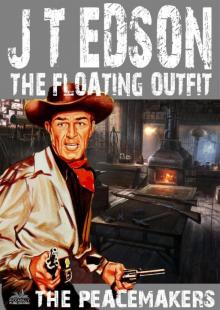 The Floating Outift 33
The Floating Outift 33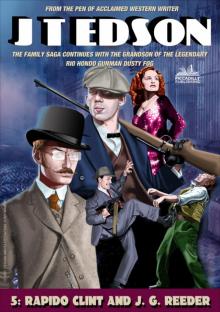 Cap Fog 5
Cap Fog 5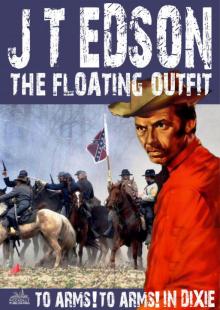 The Floating Outfit 34
The Floating Outfit 34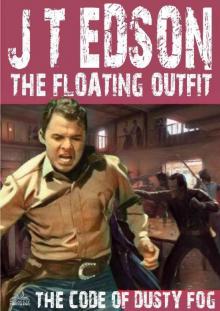 The Code of Dusty Fog
The Code of Dusty Fog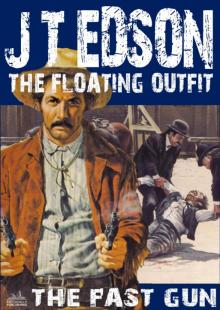 The Floating Outfit 21
The Floating Outfit 21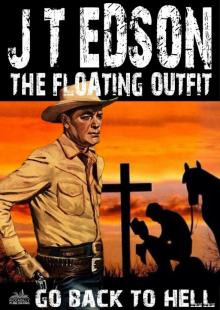 The Floating Outift 36
The Floating Outift 36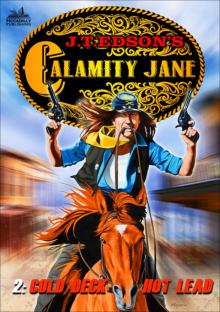 Calamity Jane 2
Calamity Jane 2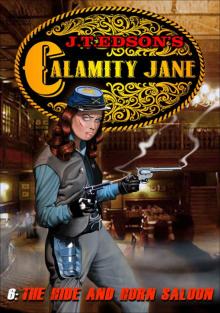 Calamity Jane 6: The Hide and Horn Saloon (A Calamity Jane Western)
Calamity Jane 6: The Hide and Horn Saloon (A Calamity Jane Western) Waco 7
Waco 7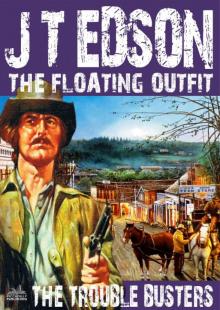 The Floating Outfit 25
The Floating Outfit 25 Waco 7: Hound Dog Man (A Waco Western)
Waco 7: Hound Dog Man (A Waco Western)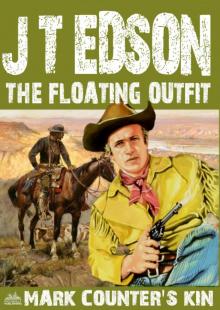 The Floating Outfit 47
The Floating Outfit 47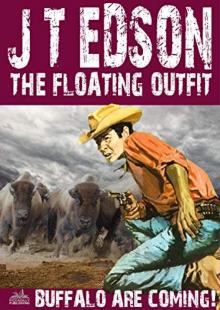 The Floating Outfit 42: Buffalo Are Coming!
The Floating Outfit 42: Buffalo Are Coming!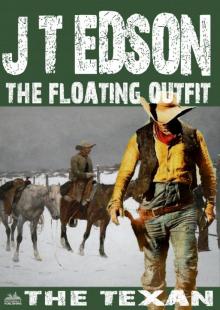 The Floating Outfit 46
The Floating Outfit 46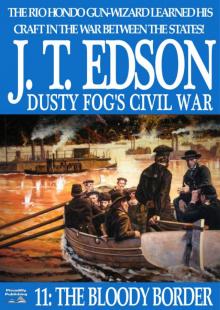 Dusty Fog's Civil War 11
Dusty Fog's Civil War 11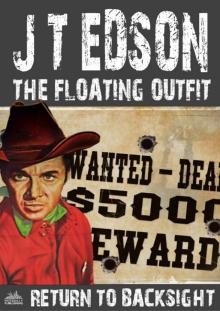 The Floating Outfit 61
The Floating Outfit 61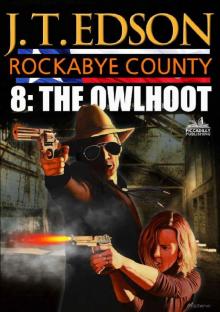 The Owlhoot
The Owlhoot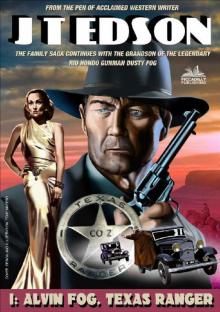 Alvin Fog, Texas Ranger
Alvin Fog, Texas Ranger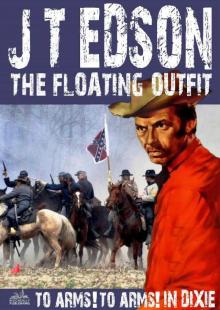 The Floating Outfit 34: To Arms! To Arms! In Dixie! (A Floating Outfit Western)
The Floating Outfit 34: To Arms! To Arms! In Dixie! (A Floating Outfit Western)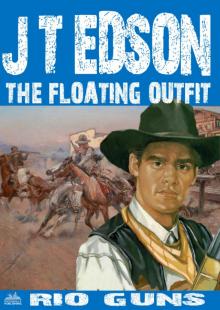 The Floating Outfit 44
The Floating Outfit 44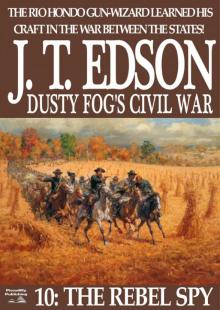 Dusty Fog's Civil War 10
Dusty Fog's Civil War 10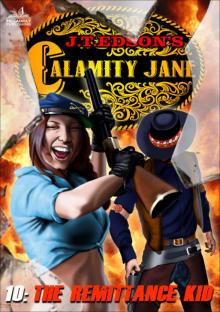 Calamity Jane 10
Calamity Jane 10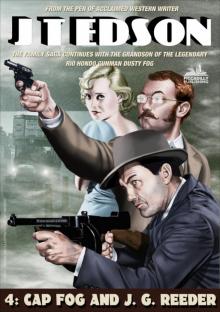 Cap Fog 4
Cap Fog 4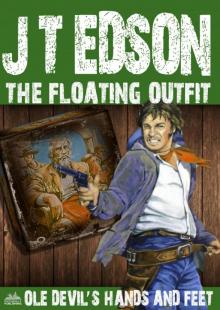 The Floating Outfit 51
The Floating Outfit 51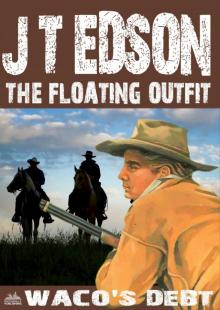 The Floating Outfit 50
The Floating Outfit 50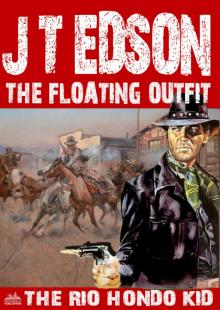 The Floating Outfit 49
The Floating Outfit 49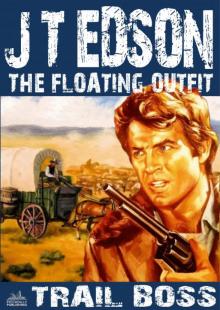 The Floating Outfit 10
The Floating Outfit 10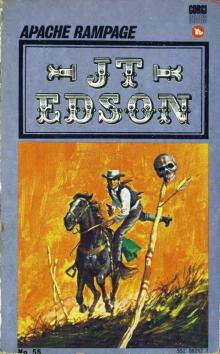 Apache Rampage
Apache Rampage The Floating Outfit 15
The Floating Outfit 15 Ranch War
Ranch War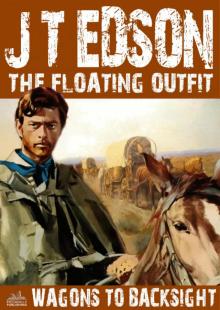 The Floating Outfit 11
The Floating Outfit 11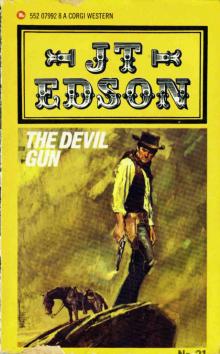 The Devil Gun
The Devil Gun Sacrifice for the Quagga God (A Bunduki Jungle Adventure Book 3)
Sacrifice for the Quagga God (A Bunduki Jungle Adventure Book 3) Comanche (A J.T. Edson Western Book 1)
Comanche (A J.T. Edson Western Book 1)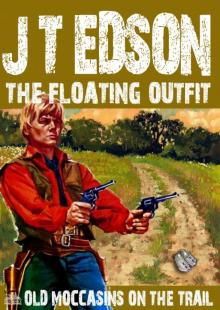 The Floating Outfit 48
The Floating Outfit 48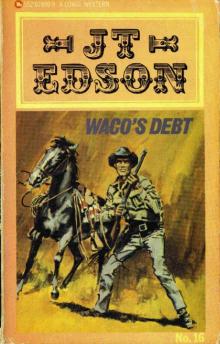 Wacos Debt
Wacos Debt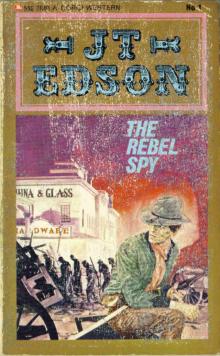 The Rebel Spy
The Rebel Spy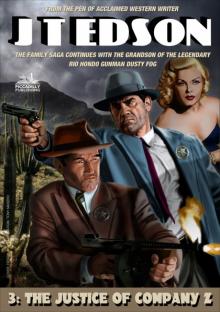 Cap Fog 3
Cap Fog 3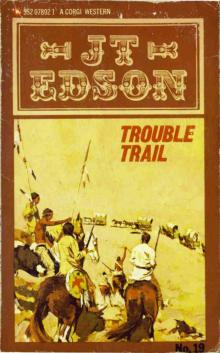 Trouble Trail
Trouble Trail Cold Deck, Hot Lead
Cold Deck, Hot Lead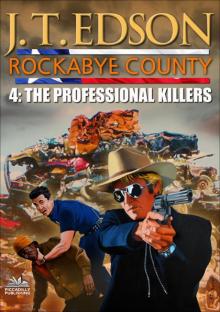 Rockabye County 4
Rockabye County 4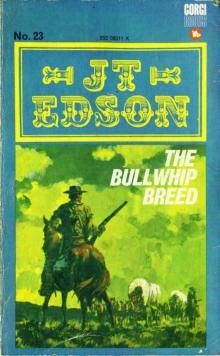 The Bullwhip Breed
The Bullwhip Breed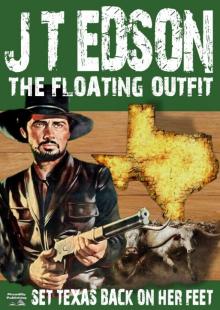 Set Texas Back On Her Feet (A Floating Outfit Western Book 6)
Set Texas Back On Her Feet (A Floating Outfit Western Book 6)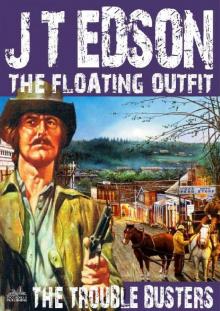 The Floating Outfit 25: The Trouble Busters (A Floating Outfit Western)
The Floating Outfit 25: The Trouble Busters (A Floating Outfit Western) Fearless Master of the Jungle (A Bunduki Jungle Adventure
Fearless Master of the Jungle (A Bunduki Jungle Adventure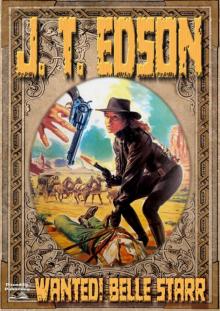 Wanted! Belle Starr!
Wanted! Belle Starr! The Big Hunt
The Big Hunt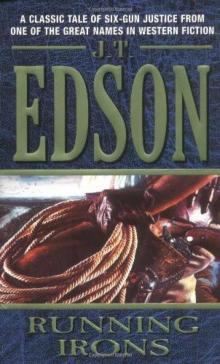 Running Irons
Running Irons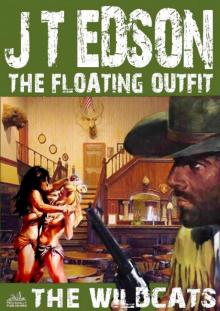 The Floating Outfit 19
The Floating Outfit 19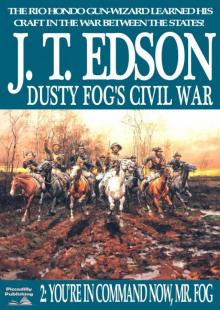 You're in Command Now, Mr Fog
You're in Command Now, Mr Fog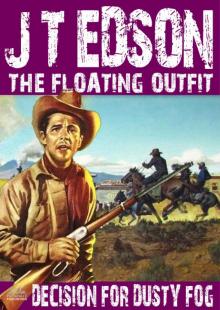 The Floating Outfit 27
The Floating Outfit 27 Texas Killers
Texas Killers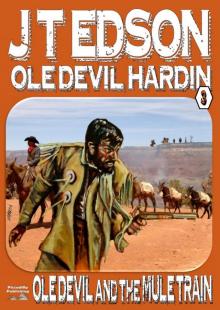 Ole Devil and the Mule Train (An Ole Devil Western Book 3)
Ole Devil and the Mule Train (An Ole Devil Western Book 3) Bunduki and Dawn (A Bunduki Jungle Adventure Book 2)
Bunduki and Dawn (A Bunduki Jungle Adventure Book 2)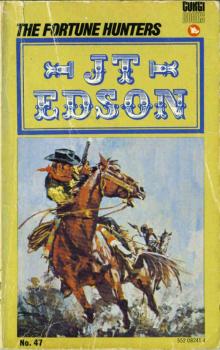 The Fortune Hunters
The Fortune Hunters The Floating Outfit 12
The Floating Outfit 12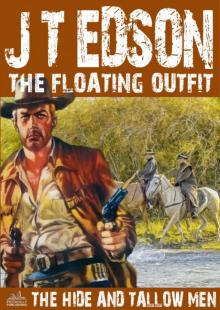 The Hide and Tallow Men (A Floating Outfit Western. Book 7)
The Hide and Tallow Men (A Floating Outfit Western. Book 7)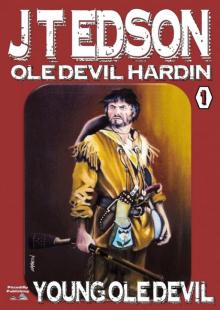 Young Ole Devil
Young Ole Devil Slip Gun
Slip Gun The Drifter
The Drifter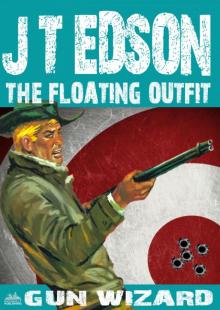 The Floating Outfit 45
The Floating Outfit 45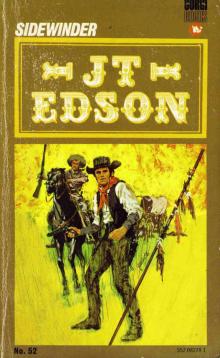 Sidewinder
Sidewinder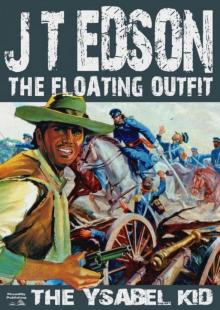 The Ysabel Kid
The Ysabel Kid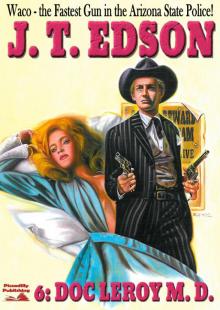 Waco 6
Waco 6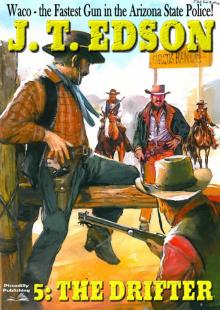 Waco 5
Waco 5 Point of Contact
Point of Contact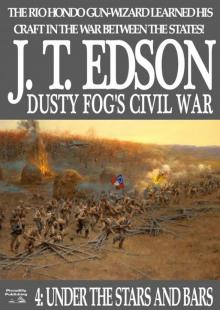 Under the Stars and Bars (A Dusty Fog Civil War Western Book 4)
Under the Stars and Bars (A Dusty Fog Civil War Western Book 4)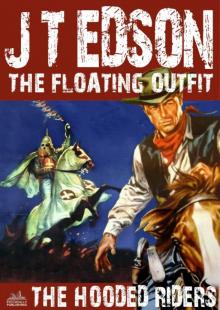 The Floating Outfit 9
The Floating Outfit 9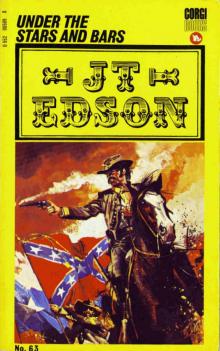 Under the Stars and Bars
Under the Stars and Bars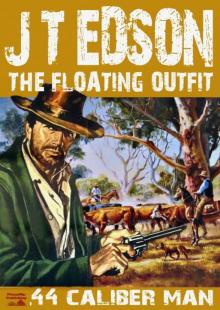 .44 Caliber Man
.44 Caliber Man The Floating Outfit 17
The Floating Outfit 17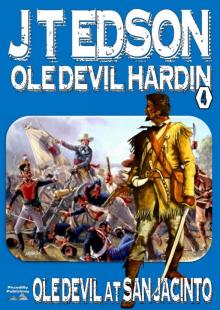 Ole Devil at San Jacinto (Old Devil Hardin Western Book 4)
Ole Devil at San Jacinto (Old Devil Hardin Western Book 4)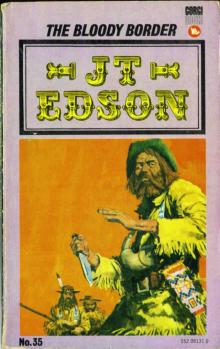 The Bloody Border
The Bloody Border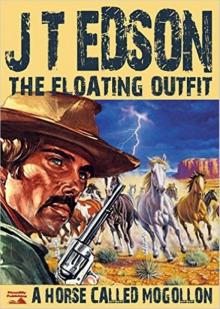 A Horse Called Mogollon (Floating Outfit Book 3)
A Horse Called Mogollon (Floating Outfit Book 3)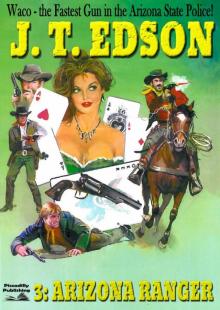 Waco 3
Waco 3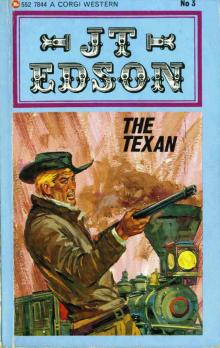 The Texan
The Texan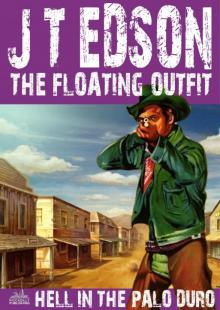 The Floating Outfit 35
The Floating Outfit 35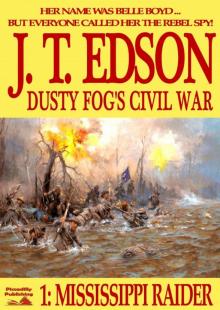 Mississippi Raider
Mississippi Raider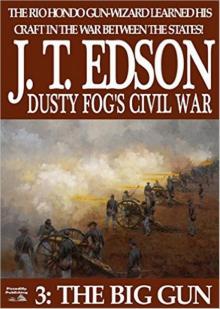 The Big Gun (Dusty Fog's Civil War Book 3)
The Big Gun (Dusty Fog's Civil War Book 3)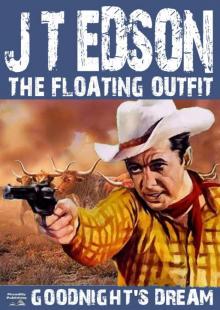 Goodnight's Dream (A Floating Outfit Western Book 4)
Goodnight's Dream (A Floating Outfit Western Book 4) Waco 4
Waco 4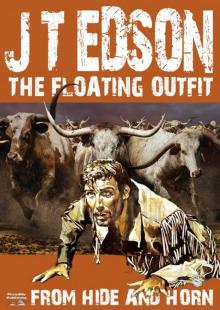 From Hide and Horn (A Floating Outfit Book Number 5)
From Hide and Horn (A Floating Outfit Book Number 5)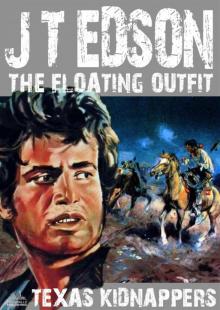 The Floating Outfit 18
The Floating Outfit 18 Slaughter's Way (A J.T. Edson Western)
Slaughter's Way (A J.T. Edson Western)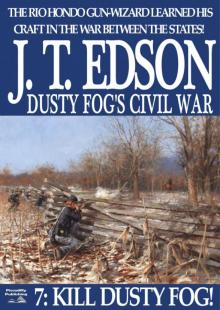 Dusty Fog's Civil War 7
Dusty Fog's Civil War 7 Two Miles to the Border (A J.T. Edson Western)
Two Miles to the Border (A J.T. Edson Western)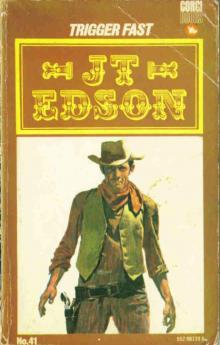 Trigger Fast
Trigger Fast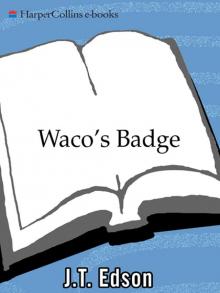 Waco's Badge
Waco's Badge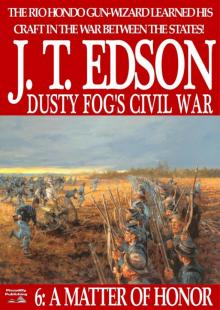 A Matter of Honor (Dusty Fog Civil War Book 6)
A Matter of Honor (Dusty Fog Civil War Book 6)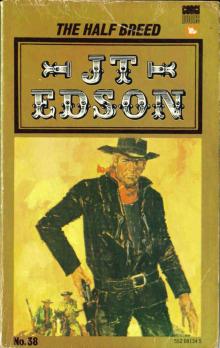 The Half Breed
The Half Breed Bunduki (Bunduki Series Book One)
Bunduki (Bunduki Series Book One)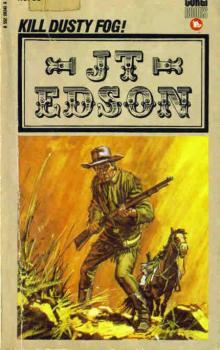 Kill Dusty Fog
Kill Dusty Fog Get Urrea! (An Ole Devil Hardin Western Book 5)
Get Urrea! (An Ole Devil Hardin Western Book 5)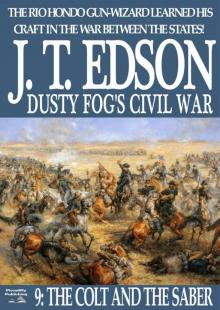 Dusty Fog's Civil War 9
Dusty Fog's Civil War 9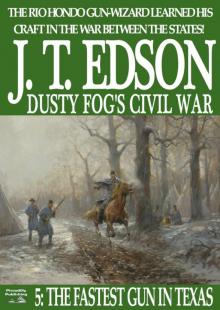 The Fastest Gun in Texas (A Dusty Fog Civil War Book 5)
The Fastest Gun in Texas (A Dusty Fog Civil War Book 5)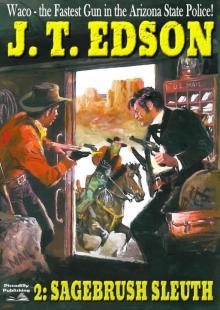 Sagebrush Sleuth (A Waco Western #2)
Sagebrush Sleuth (A Waco Western #2)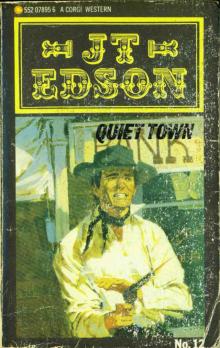 Quiet Town
Quiet Town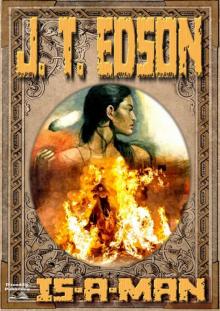 Is-A-Man (A J.T. Edson Standalone Western)
Is-A-Man (A J.T. Edson Standalone Western) Rockabye County 5
Rockabye County 5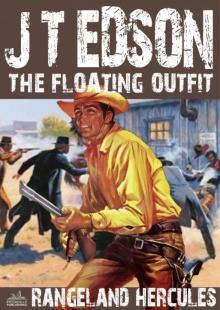 The Floating Outfit 14
The Floating Outfit 14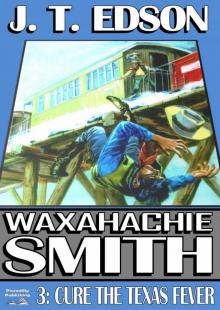 Cure the Texas Fever (A Waxahachie Smith Western--Book 3)
Cure the Texas Fever (A Waxahachie Smith Western--Book 3)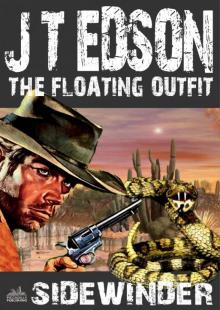 The Floating Outfit 13
The Floating Outfit 13 The Road to Ratchet Creek
The Road to Ratchet Creek